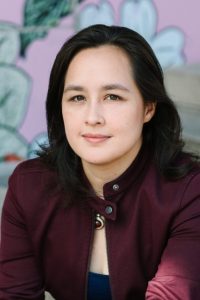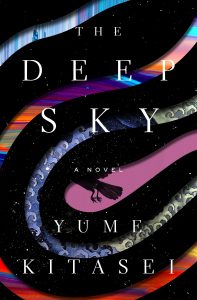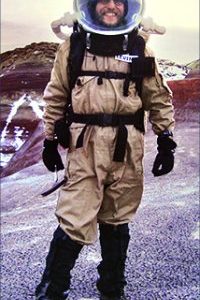Spotlight on: Yume Kitasei
 Yume Kitasei is a debut writer of speculative fiction. She is half-Japanese and half-American and grew up in a space between two cultures—the same space where her stories reside. Her stories have appeared in publications including New England Review, Catapult, SmokeLong Quarterly, and Baltimore Review. Visit her online at yumekitasei.com.
Yume Kitasei is a debut writer of speculative fiction. She is half-Japanese and half-American and grew up in a space between two cultures—the same space where her stories reside. Her stories have appeared in publications including New England Review, Catapult, SmokeLong Quarterly, and Baltimore Review. Visit her online at yumekitasei.com.
Tell us about your new novel, The Deep Sky — the world where it takes place, and the characters who inhabit that world.
The Deep Sky is a feminist space thriller about an elite crew trained from childhood to travel to and populate another planet. But then they are knocked off course by a deadly explosion and have to figure out what – or who – caused it.
The story is told in dual timelines, flashing back to how the children were originally selected for the mission as the ‘present day’ unfolds. The main character, Asuka, is mixed-race, and struggles with imposter syndrome. She was selected to represent Japan and worries she’s not “Japanese” enough, and she’s the Alternate, last-picked for the mission.
It’s science fiction, with elements of horror and mystery. I cried writing it, but I think it’s fun.
Will you return to the setting of this novel in future work or is it a standalone?
I wrote it thinking it’d be a standalone. I assumed frankly that I’d have an easier time selling a debut novel that wasn’t part of a series. And I had to read it a hundred times before it went to print, so I’m not sure I’m in a headspace to write a sequel right now. That being said, never say never. I always like to leave a few threads untied.
 You’ve said that as someone who’s half-Japanese and half-American, you “grew up in a space between two cultures — the same space where my stories reside.” Can you expand on that idea a bit?
You’ve said that as someone who’s half-Japanese and half-American, you “grew up in a space between two cultures — the same space where my stories reside.” Can you expand on that idea a bit?
When you’re biracial and bicultural, you grow up toggling back and forth between two places and sets of values. And you end up a citizen of the in-between. I never quite felt like I blended in (though I have two sisters, including a twin, so that helps). My writing is kind of the same – not just because it’s often about mixed-race characters, but also because my writing tends to cross genres. When I’m submitting my short stories for publication, I’m never sure whether I should send something to a non-genre lit mag or a SFF mag or what. I usually end up just rolling the dice.
The Deep Sky is your debut novel. Congratulations! Tell us a little about your journey from being an aspiring writer to a published one.
Thank you! I’ve been writing since I was a kid. It’s something I always felt compelled to do. I wrote three novels. Then I graduated college, and I wanted to be practical. It’s hard to live in New York City supporting yourself on a writer’s income, even if you get a good advance. Plus I like my day job. So I spent the last thirteen years coming home and writing in the evenings and on weekends and quietly sending out short stories, slowly improving my craft. A few years ago, my short stories finally started getting published. I wrote a fourth novel (my first as an adult), and it got an agent but didn’t sell. The Deep Sky is my fifth. I want people to talk more about how many novels they had to write before they published, because I went into the whole process thinking I was washed up, when actually it’s really normal. I think it’s more abnormal to publish the first novel you ever write. Don’t give up!
Talk a bit about your writing process. And, if you like, tell us about the writing accountability game you created — the one where, if you don’t meet your daily writing goals, your friends get eaten by zombies….
I’m an extroverted writer. It’s a problem. I’d much rather be hanging out with people than getting my butt in a seat and tapping away into the void. I write best when I have accountability partners who are also working on novels. We tell each other what our goals are, so we can feel more accountable for hitting those goals. Usually my goals are unrealistic, but fear of mortification is a very powerful motivator for me.
I made this game last year that takes a group of writers and each day you have to meet your goals or you all lose (and get eaten by zombies). It was a joke, but then I got a bunch of writers to play it with me, and you know what? It was very motivating, for me at least. I don’t to be responsible for people being eaten by zombies. So I put it on my website. Disclosure: it’s not a professional game that’s been play tested; I made it in an hour using powerpoint. But feel free to try it!
What writers, inside and outside the SF/fantasy/horror genres, influenced you? Have you always been a reader of speculative fiction?
I’ve already read speculative fiction. I read across genres. In no particular order, writers I return to again and again include: Kazuo Ishiguro, Connie Willis, Nnedi Okorafor, Banana Yoshimoto, John Scalzi, Cormac McCarthy, Mary Robinette Kowal, Becky Chambers, Agatha Christie. And science and history. Anything by Ed Yong or David McCullough. I’m also loving Martha Wells, Rebecca Roanhorse, Tamsyn Muir, and Sherry Thomas. And every year, I read the Booker longlist in the month of August with a bunch of friends. It’s our bookworm version of a marathon, and I love it so much.
Is there anything else you’d like our readers to know? Upcoming work or other projects of note?
I’m working on a new book! It’ll be out next year. It’s an anti-colonial space heist book about a former interstellar art thief turned PhD student whose friend convinces her to do one last job. Except finding and stealing this artifact may mean choosing between saving an alien race from extinction…and dooming humanity. I’m having a ton of fun writing it despite the deadline. Nobody say “sophomore slump” to me please, though, or I will probably burst into tears. After I’m done with this, I’m probably going to write something that’s more grounded, closer to the vein of Sequoia Nagamatsu and Emily St. John Mandel. I have an idea, but I’m not ready to talk about it yet.
 While you are here, please take a moment to support Locus with a one-time or recurring donation. We rely on reader donations to keep the magazine and site going, and would like to keep the site paywall free, but WE NEED YOUR FINANCIAL SUPPORT to continue quality coverage of the science fiction and fantasy field.
While you are here, please take a moment to support Locus with a one-time or recurring donation. We rely on reader donations to keep the magazine and site going, and would like to keep the site paywall free, but WE NEED YOUR FINANCIAL SUPPORT to continue quality coverage of the science fiction and fantasy field.
©Locus Magazine. Copyrighted material may not be republished without permission of LSFF.







